When it comes to having a healthy breakfast, we’re told to opt for high-fiber and high nutrition options, which will set us up for the day.
Health professionals often recommend bran-based cereals such as All-Bran and Bran Flakes, especially if you’ve been told to up your fiber intake, but which cereal offers the most benefits?
In this article, I’ll be comparing bran-based cereals Kellogg’s All-Bran and Bran Flakes head-to-head in various categories to help you make an informed decision on which is the best cereal for you.
Including; comparisons between ingredients, nutrition, and you get to vote in our poll to find out which is your favorite for taste and texture.
Also in This Article
In a hurry, or looking for something specific? Use the links below to jump to the relevant section:
Ingredients Comparision
The table below shows a comparison between the ingredients of All-Bran and Bran Flakes, along with added vitamins and minerals.
The main difference between the ingredients of the two kinds of cereal is that All-Bran is made predominately from Wheat Bran, whereas the main ingredient of Bran Flakes is Wholewheat and Wheat Bran.
Both kinds of cereal are fortified with the same types of vitamins and minerals, which are standard additions to most Kellogg’s cereals (Find out more about the amounts of vitamins and minerals per cereal later in this article).
| Cereal Type | Ingredients | Added Vitamins & Minerals |
| Kellogg’s All-Bran | Wheat bran (86%), sugar, barley malt extract, salt. | Niacin, iron, vitamin B6, riboflavin, thiamin, folic acid, vitamin D, vitamin B12. |
| Kellogg’s Bran Flakes | Wholewheat (59%), wheat bran (18%), wholewheat flour, sugar, barley malt extract, glucose syrup, salt, natural flavoring. | Niacin, iron, vitamin B6, riboflavin, thiamin, folic acid, vitamin D, vitamin B12. |
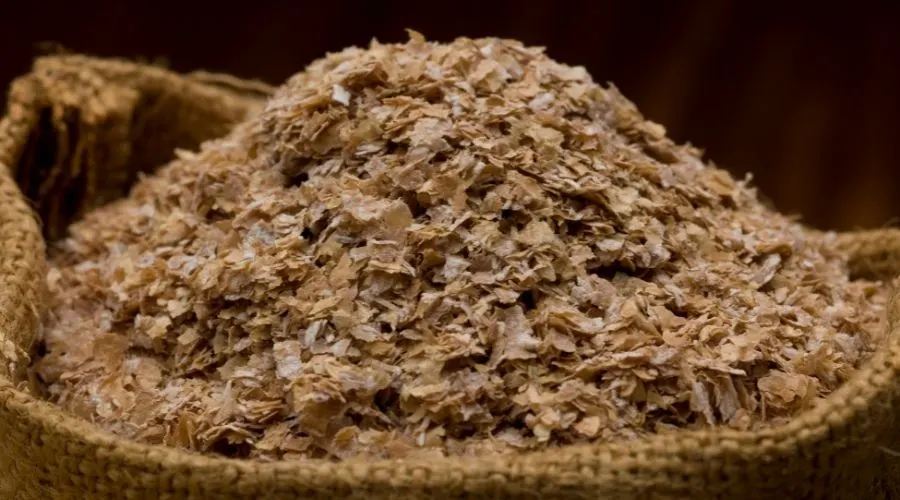
All-Bran Vs. Bran Flakes Nutritional Comparison
Moving onto the nutritional comparison between Kellogg’s All-Bran and Kellogg’s Bran-Flakes for various categories.
To make the most accurate comparison, we need to compare each cereal’s weight for weight because a recommended serving of All-Bran weighs 15g more than a recommended serving of Bran Flakes. I’ve also included the data per serving for information, although they’re different weights.
Best for Calorie Content
The first nutritional comparison is calories per weight of cereal, and the breakfast cereal with the lowest calories between Kellogs All-Bran and Bran Flakes is All-bran.
Weight-for-weight and per 100g of cereal, All-Bran contains 24kcal fewer calories than Bran Flakes.
Per recommend serving All-Bran contains more calories because a serving contains 15g more cereal than a serving of Bran-Flakes.
| Cereal Type | Calories Per 100g | Calories Per Serving |
| Kellogg’s All-Bran | 334kcal | 150kcal (Per 45g Serving) |
| Kellogg’s Bran Flakes | 358kcal | 107kcal (Per 30g Serving) |
Best for Carbohydrate Content
When comparing carbohydrates, neither cereal can be considered a low-carb breakfast option. Still, if this is something you need to consider, All-Bran contains less carbohydrate per 100g of cereal and is the lower-carb option.
| Cereal Type | Carbohydrates Per 100g | Carbohydrates Per Serving |
| Kellogg’s All-Bran | 48g | 22g (Per 45g Serving) |
| Kellogg’s Bran Flakes | 65g | 20g (Per 30g Serving) |
The recommended daily intake of carbohydrates for a 2,000 calorie diet is approximately 275 grams (based on 55% of daily caloric intake from carbs).
- All-Bran contains 48g of carbs per 100g, which is 17.5% of the daily value (DV).
- Bran Flakes contains 65g of carbs per 100g, which is 23.6% of the daily value (DV).
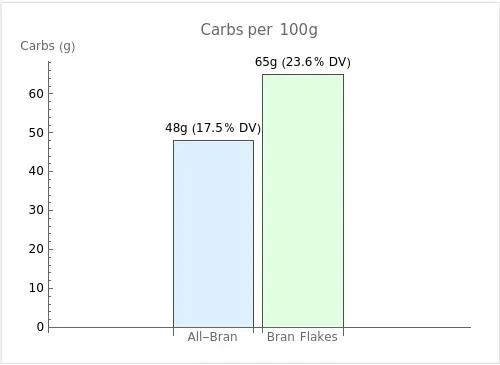
Best for Sugar Content
Considering that both All-Bran and Bran Flakes are marketed as healthy options while making this comparison, I was surprised by the amount of sugar they contain, especially because many people choose to add a sprinkle of extra sugar to their cereal.
Weight-for-weight, the lower sugar option between All-Bran and Bran Flakes is Bran Flakes, which contains 14g of Sugar compared to All-Bran, which has 18g per 100g.
| Cereal Type | Sugars Per 100g | Sugars Per Serving |
| Kellogg’s All-Bran | 18g | 8.1g (Per 45g Serving) |
| Kellogg’s Bran Flakes | 14g | 4.2g (Per 30g Serving) |
Best for Protein Content
If a cereal with a higher protein content is important for you, the cereal with the most protein per weight is Bran Flakes, with 17g of protein per 100g compared to All-Bran, which contains 14g.
| Cereal Type | Protein Per 100g | Protein Per Serving |
| Kellogg’s All-Bran | 14g | 6.3g (Per 45g Serving) |
| Kellogg’s Bran Flakes | 17g | 5.1g (Per 30g Serving) |
The recommended daily intake of protein for a 2,000 calorie diet is approximately 75 grams (based on 15% of daily caloric intake from protein).
- All-Bran contains 14g of protein per 100g, which is approximately 18.7% of the daily value (DV).
- Bran Flakes contains 17g of protein per 100g, which is approximately 22.7% of the daily value (DV).
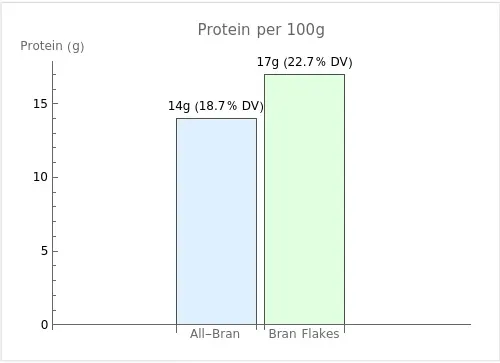
Best for Fat Content
When it comes to fat content, both kinds of cereals are low in fat and saturated fat, but the cereal with the lowest amount of fat is Bran Flakes, with only 2.2g of fat per 100g.
It’s important to note that neither cereals have fatty ingredients, suggesting the fat comes from natural fats found in whole grains, which could be considered good fats.
The tables below show the fat and saturated fat content per 100g of cereal as well as per recommended serving:
Per 100g
| Cereal Type | Fat Per 100g | Saturated Fat per 100g |
| Kellogg’s All-Bran | 3.5g | 0.7g |
| Kellogg’s Bran Flakes | 2.2g | 0.4g |
Per Recommended Serving
| Cereal Type | Fat Per Serving | Saturated Fat per Serving |
| Kellogg’s All-Bran (Per 45g Serving) | 1.6g | 0.3g |
| Kellogg’s Bran Flakes (Per 30g Serving) | 0.7g | 0.1g |
Best for Fiber Content
The next category and probably one of the most important for many consumers is fiber content. Many people eat a high-fiber cereal for breakfast to get towards their recommended fiber intake for the day.
When it comes to All-Bran and Bran Flakes, although both kinds of cereal are high in fiber, All-Bran is the clear winner with 27g of fiber per 100g compared to 17g in Bran Flakes.
| Cereal Type | Dietary Fibre Per 100g | Dietary Fibre per Serving |
| Kellogg’s All-Bran | 27g | 12g (Per 45g Serving) |
| Kellogg’s Bran Flakes | 17g | 5.1g (Per 30g Serving) |
The recommended daily intake of fiber for adults is approximately 25 grams.
- All-Bran contains 27g of fiber per 100g, which is 108% of the daily value (DV).
- Bran Flakes contains 15g of fiber per 100g, which is 60% of the daily value (DV).
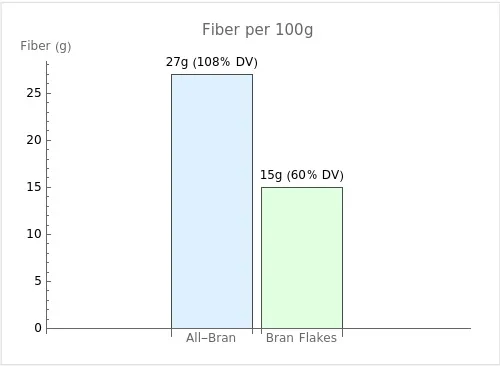
Best for Vitamins/Minerals
Both Kellogg’s All-Bran and Bran Flakes are fortified with vitamins and minerals to help consumers get closer to their daily recommended values of key nutrients.
Although both kinds of cereal are fortified with the same nutrients, the levels of these nutrients differ between the two.
The cereal with higher levels of most nutrients is Bran Flakes, although All-Bran is slightly higher in Folic Acid and Iron.
| Vitamin/Mineral Type | Vitamin/Mineral Amount per 100g of All-Bran | Vitamin/Mineral Amount per 100g of Bran-Flakes |
| Vitamin D | 6.3mcg * | 8.4mcg |
| Thiamin (Vitamin B1) | 0.69mg * | 0.91mg |
| Riboflavin (Vitamin B2) | 0.88mg | 1.2mg |
| Niacin | 10mg | 13mg |
| Vitamin B6 | 0.88mg | 1.2mg |
| Folic Acid | 250mcg | 1.66mcg |
| Vitamin B12 | 1.6mcg | 2.1mcg |
| Iron | 8.8mg | 8mg |
*mcg = microgram (1000th of a milligram) / mg = milligram (1000th of a gram)
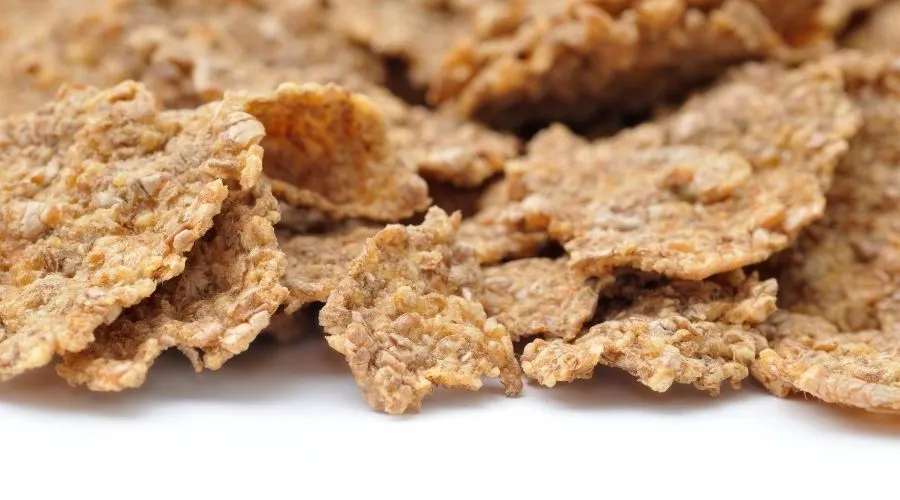
Best for Flavor/Texture
Because both kinds of cereal are bran-based, they have a similar texture and flavor but which is best is a subjective question that is down to the individual.
To get a public opinion from a broad demographic, we’ve put together a poll so our readers can choose their favorite, and we can build a picture on which is deemed best for flavor.
Please take part in our poll (no personal information required) to tell us your favorite and to reveal the public favorite so far.
Best for Price
At the time of writing this article (in March 2022), the average price of a 750g box of Kellogg’s Bran Flakes and a 750g box of All-Bran in the UK are both £3.00.
Based on this information, weight-for-weight, both kinds of cereal cost the same amount.
Overall Winner
We’ve now compared calories, nutritional information, and cost, and the winner of the best cereal in most categories is – Bran Flakes.
Compared to All-Bran, Bran Flakes are lowest in calories, carbs, Sugar, and Fat while being the highest in protein, vitamins, and minerals.
It’s important to note that while Bran Flakes is the winner of most categories, All-Bran contains a substantial amount of fiber which is important for many consumers who choose it as a breakfast cereal.
Which cereal is best for you depends on what is most important to you and your diet, and hopefully, the information in this article can help you make an informed choice based on a fair comparison.
| Comparison Category | Winner (All-Bran or Bran Flakes) |
| Best for Calorie Content | All-Bran |
| Best for Carbohydrate Content | All-Bran |
| Best for Sugar Content | Bran Flakes |
| Best for Protein Content | Bran Flakes |
| Best for Fat Content | Bran Flakes |
| Best for Fiber Content | All-Bran |
| Best for Vitamins/Minerals | Bran Flakes |
| Best for Price | Joint Winners |
| Overall Winner | Bran Flakes |
Related Articles
I hope this article has helped you to find the information you were looking for; you might also find the following articles helpful too:
Coco Pops Vs. Rice Krispies (What’s the Difference?)
Canned Potatoes Vs. Fresh (What’s the Difference?)
References Used for this Article
To ensure the nutritional information used in this article is accurate, I have used data from both the original producers and the USDA; the links below contain the source information:
